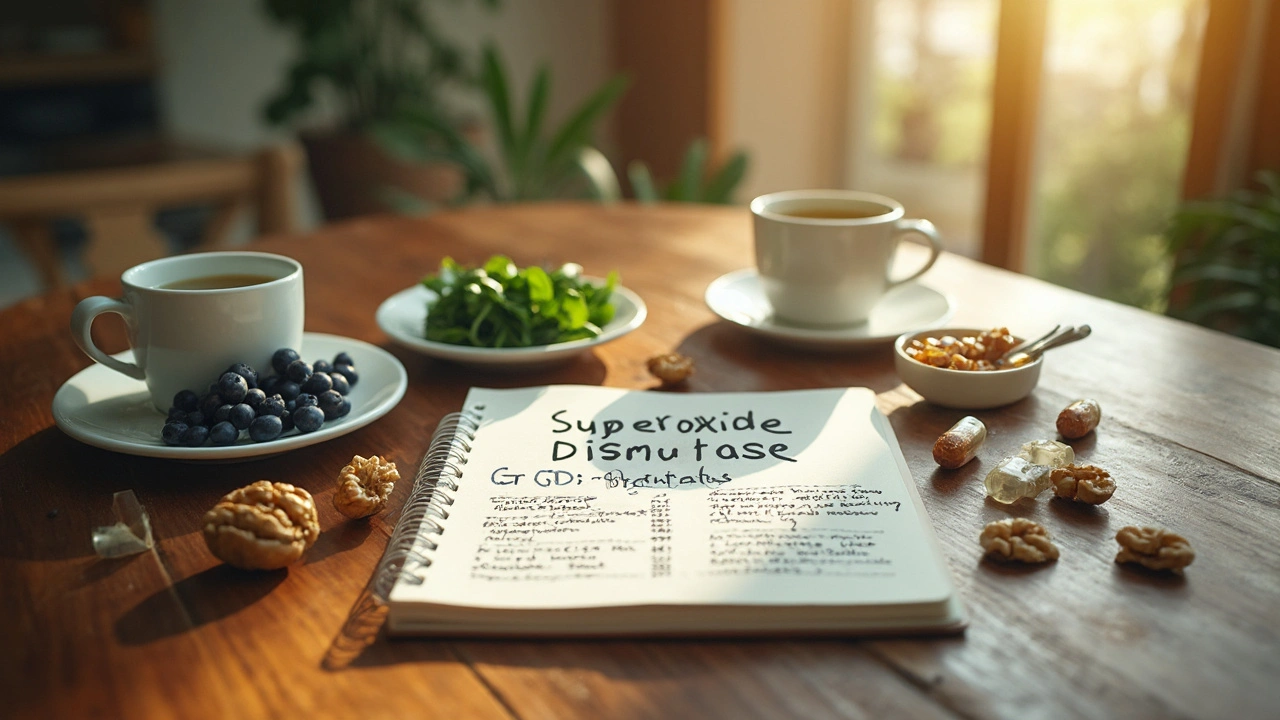Superoxide Dismutase (SOD): What It Does and How to Use It
Superoxide dismutase (SOD) is an enzyme your body makes to fight free radicals. Those free radicals are unstable oxygen molecules that damage cells. SOD converts a common reactive molecule, superoxide, into less harmful substances. That simple job helps protect tissues and keeps inflammation lower.
SOD isn't one thing—there are several types. SOD1 is mostly inside cells in the cytoplasm. SOD2 sits in mitochondria, the cell's power plants. SOD3 is found outside cells, in fluids and tissues. Each type works in a different place, but all reduce oxidative stress in their local spot.
Where SOD comes from and how to boost it
Your body produces SOD naturally, and diet can help. Foods rich in copper, zinc, and manganese support SOD activity because those minerals are part of the enzyme. Think nuts, seeds, whole grains, shellfish, and leafy greens. Some plants—like broccoli, cabbage, and wheat sprouts—contain SOD-like activity or compounds that raise antioxidant defenses.
People also take SOD as a supplement. Supplements vary: some use stabilized plant extracts (melon or wheat), others use bovine- or yeast-derived forms. Note that plain SOD is a protein and can be broken down in the gut, so many products use forms designed to survive digestion or to boost your own SOD production instead of delivering the intact enzyme.
Who might benefit and what the research says
Research looks promising but mixed. Small studies suggest SOD supplements can help with exercise recovery, reduce skin aging markers, and ease some inflammatory conditions. For example, topical SOD products may reduce redness and oxidative signs in sun-exposed skin. Oral preparations that increase antioxidant defenses have shown modest benefits in inflammatory bowel disease and joint discomfort in some trials. Still, results vary by product, dose, and study size.
Use SOD supplements as a complementary approach, not a cure. They can support antioxidant balance but won’t replace medical treatment for serious conditions.
Safety and practical tips: check the product source and look for third-party testing. Start with the lowest effective dose and watch for allergic reactions if a product is animal-derived. If you take medications for blood pressure, diabetes, or cancer, check with your provider before adding potent antioxidant supplements—interactions are rare but possible.
Want to try boosting SOD naturally? Add more nuts, seeds, legumes, leafy greens, and whole grains to your meals. Keep active—regular exercise upregulates your body's antioxidant systems, including SOD. If you’re considering a supplement, pick brands that explain how they protect the enzyme from digestion or stimulate its production in the body.
If oxidative stress is part of a health problem you’re managing, talk to your clinician about measured antioxidant strategies. They can suggest tests, timing, and appropriate products that fit your health needs and current treatments.

Superoxide Dismutase Supplement: Unlocking Next-Level Antioxidant Benefits
Superoxide dismutase (SOD) stands out as a powerful antioxidant supplement with the potential to transform health routines. This article uncovers why SOD matters, how it protects against oxidative damage, the possible perks for anti-aging, and practical ways to include it in your diet. Discover specific facts, get evidence-based tips, and see if this is the supplement your body truly needs. The guide covers science, supplementation, and the latest trends in SOD use for modern lifestyles.
Categories
- Medications (71)
- Health and Medicine (62)
- Health and Wellness (37)
- Online Pharmacy Guides (16)
- Nutrition and Supplements (9)
- Parenting and Family (3)
- Environment and Conservation (2)
- healthcare (2)
- prescription savings (1)



